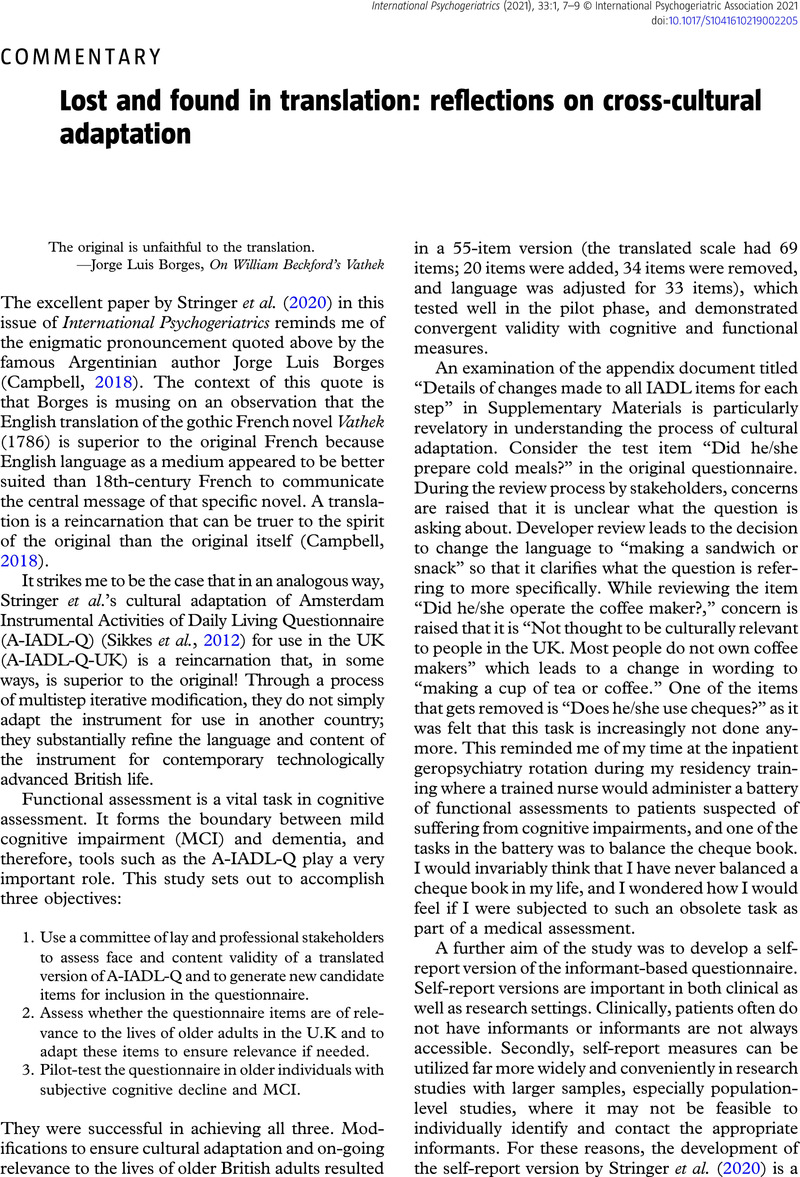No CrossRef data available.
Article contents
Lost and found in translation: reflections on cross-cultural adaptation
Published online by Cambridge University Press: 05 February 2021
Abstract
An abstract is not available for this content so a preview has been provided. Please use the Get access link above for information on how to access this content.

- Type
- Commentary
- Information
- International Psychogeriatrics , Volume 33 , Special Issue 1: Issue Theme: Assessment of Risk Markers for Cognitive Impairment , January 2021 , pp. 7 - 9
- Copyright
- © International Psychogeriatric Association 2021
References
Beaton, D. E., Bombardier, C., Guillemin, F. and Ferraz, M. B. (2000). Guidelines for the process of cross-cultural adaptation of self-report measures. Spine (Phila Pa 1976), 25, 3186–3191. doi: 10.1097/00007632-200012150-00014.CrossRefGoogle ScholarPubMed
Campbell, B. (2018). The original is unfaithful to the translation: towards recognising originality in translation. Neke. The New Zealand Journal of Translation Studies, 1,
1–29. doi: 10.26686/neke.v1i1.5158.CrossRefGoogle Scholar
Dominguez, J. C. etal. (2013). Adaptation of the Montreal Cognitive Assessment for elderly Filipino patients. East Asian Archives of Psychiatry, 23, 80–85. https://www.easap.asia/index.php/component/k2/item/199-1303-v23n3-p80.Google ScholarPubMed
Franzen, S. etal. (2019). A systematic review of neuropsychological tests for the assessment of dementia in non-western, low-educated or illiterate populations. Journal of the International Neuropsychological Society, 1–21. doi: 10.1017/S1355617719000894.Google ScholarPubMed
Lee, J. Y. etal. (2008). Brief screening for mild cognitive impairment in elderly outpatient clinic: validation of the Korean version of the Montreal Cognitive Assessment. Journal of Geriatric Psychiatry and Neurology, 21,
104–110. doi: 10.1177/0891988708316855.CrossRefGoogle ScholarPubMed
Marshall, G. A. etal. (2015). Functional activities questionnaire items that best discriminate and predict progression from clinically normal to mild cognitive impairment. Current Alzheimer Research, 12, 493–502. doi: 10.2174/156720501205150526115003.CrossRefGoogle ScholarPubMed
Sajatovic, M. etal. (2018). The Community-targeted Self-management of Epilepsy and Mental Illness (C-TIME) initiative: a research, community, and healthcare administration partnership to reduce epilepsy burden. Epilepsy and Behavior, 89, 175–180. doi: 10.1016/j.yebeh.2018.10.004.CrossRefGoogle ScholarPubMed
Sajatovic, M. etal. (2016). Targeted self-management of epilepsy and mental illness for individuals with epilepsy and psychiatric comorbidity. Epilepsy and Behavior, 64, 152–159. doi: 10.1016/j.yebeh.2016.08.012.CrossRefGoogle ScholarPubMed
Sikkes, S. A. etal. (2012). A new informant-based questionnaire for instrumental activities of daily living in dementia. Alzheimer’s and Dementia, 8, 536–543. doi: 10.1016/j.jalz.2011.08.006.CrossRefGoogle ScholarPubMed
Stringer, G., Leroi, I., Sikkes, S., Montaldi, D. and Brown, L. (2020). Enhancing ‘meaningfulness’ of functional assessments: UK adaptation of the Amsterdam IADL questionnaire. International Psychogeriatrics,
33, 39–50. doi: 10.1017/S1041610219001881.Google Scholar
Uysal-Bozkir, O., Parlevliet, J. L. and de Rooij, S. E. (2013). Insufficient cross-cultural adaptations and psychometric properties for many translated health assessment scales: a systematic review. Journal of Clinical Epidemiology, 66, 608–618. doi: 10.1016/j.jclinepi.2012.12.004.CrossRefGoogle ScholarPubMed


